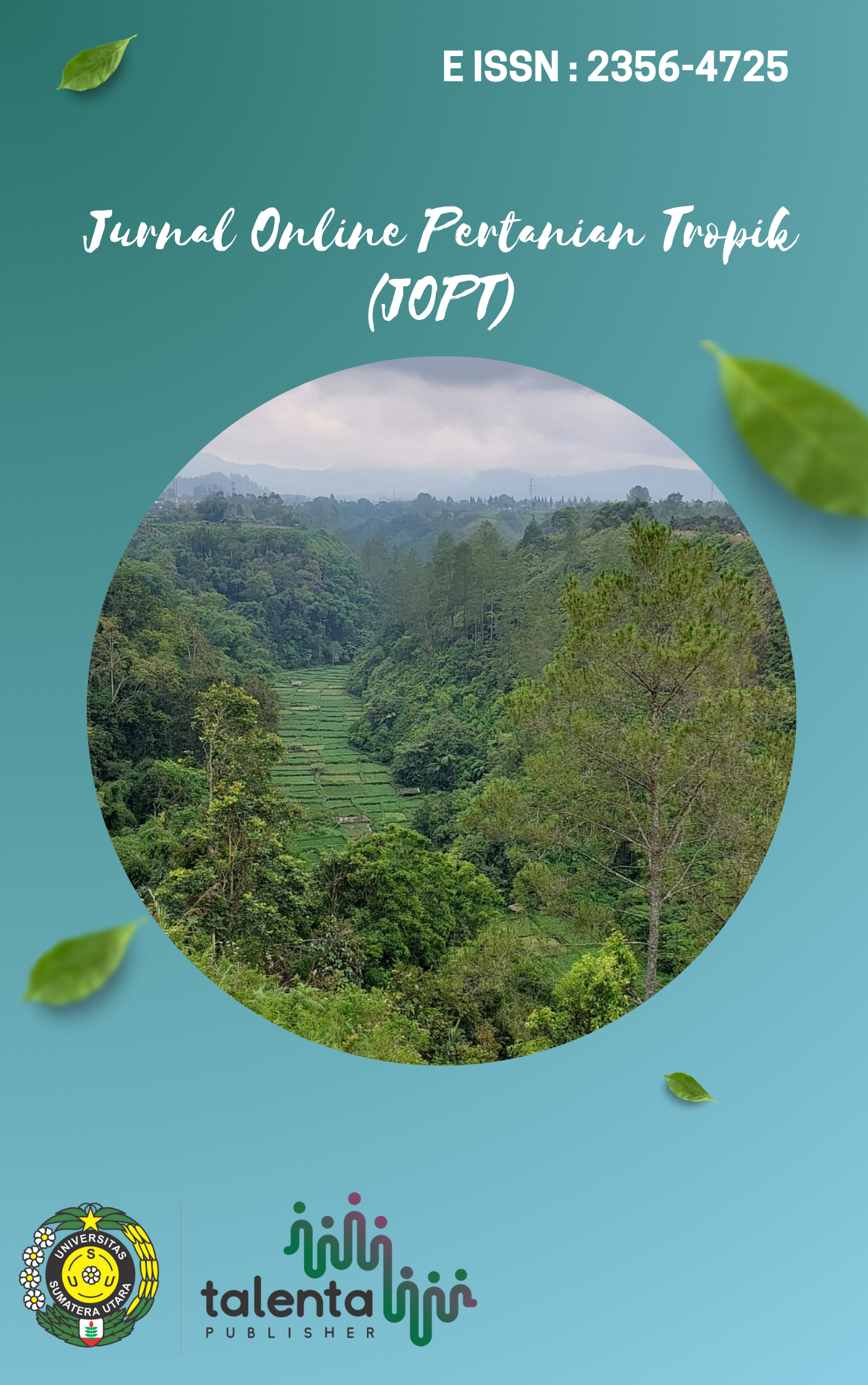Biochar from Raw Materials Arundo Spp; Effect on Corn Plant Growth and Production
DOI:
https://doi.org/10.32734/jopt.v10i2.15181Keywords:
Bahan baku, Biochar, Arundo spp. jagungAbstract
Biochar is widely used for water and soil remediation due to its local availability and low production costs. However, its effectiveness depends on the physicochemical properties related to the raw material and pyrolysis temperature, as well as the environmental conditions where it is used. Additionally, biochar is susceptible to natural aging caused by changes in soil or sediment moisture, which can alter its redox properties and interactions with contaminants such as arsenic. Therefore, we are interested in conducting fundamental research on raw materials from grass types and their influence on the growth and production of QPM corn plants. In this research, we carried out laboratory content tests and field experiments. The treatments were: p0 control, p1 = 3 tons ha-1 biochar, p2 = 6 tons ha-1 biochar, p3 = 9 tons ha-1, p4 = 12 tons ha-1, p5 = 15 tons ha-1. The experimental results showed that the administration of biochar made from Arundo Spp. 12 tons Ha-1 can increase the effective growth and production of corn plants
Downloads
References
Borchard, N., Schirrmann, M., Cayuela, M. L., Kammann, C., Wrage-Mönnig, N., Estavillo, J. M., Fuertes-Mendizábal, T., Sigua, G., Spokas, K., Ippolito, J. A., & Novak, J. (2019a). Biochar, soil and land-use interactions that reduce nitrate leaching and N2O emissions: A meta-analysis. In Science of the Total Environment (Vol. 651, pp. 2354–2364). Elsevier B.V. https://doi.org/10.1016/j.scitotenv.2018.10.060
Borchard, N., Schirrmann, M., Cayuela, M. L., Kammann, C., Wrage-Mönnig, N., Estavillo, J. M., Fuertes-Mendizábal, T., Sigua, G., Spokas, K., Ippolito, J. A., & Novak, J. (2019b). Biochar, soil and land-use interactions that reduce nitrate leaching and N2O emissions: A meta-analysis. Science of the Total Environment, 651, 2354–2364. https://doi.org/10.1016/j.scitotenv.2018.10.060
Brewer, C. E., Loynachan, T. E., Schmidt-Rohr, K., Shanks, B. H., & Vigil, D. R. (2012). Biochar characterization and engineering.
Chen, H., Ma, J., Wei, J., Gong, X., Yu, X., Guo, H., & Zhao, Y. (2018). Biochar increases plant growth and alters microbial communities via regulating the moisture and temperature of green roof substrates. Science of the Total Environment, 635, 333–342. https://doi.org/10.1016/j.scitotenv.2018.04.127
El-Naggar, A., Lee, S. S., Rinklebe, J., Farooq, M., Song, H., Sarmah, A. K., Zimmerman, A. R., Ahmad, M., Shaheen, S. M., & Ok, Y. S. (2019). Biochar application to low fertility soils: A review of current status, and future prospects. In Geoderma (Vol. 337, pp. 536–554). Elsevier B.V. https://doi.org/10.1016/j.geoderma.2018.09.034
Gao, S., Harrison, B. P., Thao, T., Gonzales, M. L., An, D., Ghezzehei, T. A., Diaz, G., & Ryals, R. A. (2023). Biochar co-compost improves nitrogen retention and reduces carbon emissions in a winter wheat cropping system. GCB Bioenergy. https://doi.org/10.1111/gcbb.13028
Guo, S., Wu, J., Han, Z., Li, Z., Xu, P., Liu, S., Wang, J., & Zou, J. (2022). The legacy effect of biochar application on soil nitrous oxide emissions. GCB Bioenergy. https://doi.org/10.1111/gcbb.13022
Hidayat, B., Ulina S, N. W., & Utami, A. (2022). Utilization of Biomass in The Form Biochar and Compost on Soil Properties. Jurnal Pertanian Tropik, 9(3), 182–191. https://doi.org/10.32734/jpt.v9i3
Ippolito, J. A., Cui, L., Kammann, C., Wrage-Mönnig, N., Estavillo, J. M., Fuertes-Mendizabal, T., Cayuela, M. L., Sigua, G., Novak, J., Spokas, K., & Borchard, N. (2020). Feedstock choice, pyrolysis temperature and type influence biochar characteristics: a comprehensive meta-data analysis review. In Biochar (Vol. 2, Issue 4, pp. 421–438). Springer Science and Business Media B.V. https://doi.org/10.1007/s42773-020-00067-x
Joseph, S., Cowie, A. L., Van Zwieten, L., Bolan, N., Budai, A., Buss, W., Cayuela, M. L., Graber, E. R., Ippolito, J. A., Kuzyakov, Y., Luo, Y., Ok, Y. S., Palansooriya, K. N., Shepherd, J., Stephens, S., Weng, Z., & Lehmann, J. (2021). How biochar works, and when it doesn’t: A review of mechanisms controlling soil and plant responses to biochar. In GCB Bioenergy (Vol. 13, Issue 11, pp. 1731–1764). John Wiley and Sons Inc. https://doi.org/10.1111/gcbb.12885
Laghari, M., Naidu, R., Xiao, B., Hu, Z., Mirjat, M. S., Hu, M., Kandhro, M. N., Chen, Z., Guo, D., Jogi, Q., Abudi, Z. N., & Fazal, S. (2016). Recent developments in biochar as an effective tool for agricultural soil management: a review. In Journal of the Science of Food and Agriculture (Vol. 96, Issue 15, pp. 4840–4849). John Wiley and Sons Ltd. https://doi.org/10.1002/jsfa.7753
Li, Z., Unzué-Belmonte, D., Cornelis, J. T., Linden, C. Vander, Struyf, E., Ronsse, F., & Delvaux, B. (2019). Effects of phytolithic rice-straw biochar, soil buffering capacity and pH on silicon bioavailability. Plant and Soil. https://doi.org/10.1007/s11104-019-04013-0
Liu, L., Tan, Z., Gong, H., & Huang, Q. (2019). Migration and Transformation Mechanisms of Nutrient Elements (N, P, K) within Biochar in Straw-Biochar-Soil-Plant Systems: A Review. In ACS Sustainable Chemistry and Engineering (Vol. 7, Issue 1, pp. 22–32). American Chemical Society. https://doi.org/10.1021/acssuschemeng.8b04253
Simanjuntak, D. M., Rahmawati, N., Program, R. S., Agroteknologi, S., Pertanian, F., & Medan, U. (2018a). Respons Pertumbuhan dan Produksi Tanaman Jagung Manis Terhadap Aplikasi Biochar dan Pupuk Organik Cair Growth Response and Production of Sweet Corn Crop by Application of Biochar and Liquid Organic Fertilizer. In Jurnal Pertanian Tropik e-ISSN (Vol. 5, Issue 3). https://jurnal.usu.ac.id/index.php/Tropik
Simanjuntak, D. M., Rahmawati, N., Program, R. S., Agroteknologi, S., Pertanian, F., & Medan, U. (2018b). Respons Pertumbuhan dan Produksi Tanaman Jagung Manis Terhadap Aplikasi Biochar dan Pupuk Organik Cair Growth Response and Production of Sweet Corn Crop by Application of Biochar and Liquid Organic Fertilizer. In Jurnal Pertanian Tropik e-ISSN (Vol. 5, Issue 3). https://jurnal.usu.ac.id/index.php/Tropik
Sohi, S. P., Krull, E., Lopez-Capel, E., & Bol, R. (2010). A review of biochar and its use and function in soil. Advances in Agronomy, 105(1), 47–82. https://doi.org/10.1016/S0065-2113(10)05002-9
Tripathi, M., Sahu, J. N., & Ganesan, P. (2016). Effect of process parameters on production of biochar from biomass waste through pyrolysis: A review. In Renewable and Sustainable Energy Reviews (Vol. 55, pp. 467–481). Elsevier Ltd. https://doi.org/10.1016/j.rser.2015.10.122
Wang, Y., Liu, Y., Zhan, W., Zheng, K., Wang, J., Zhang, C., & Chen, R. (2020). Stabilization of heavy metal-contaminated soils by biochar: Challenges and recommendations. Science of the Total Environment, 729, 139060. https://doi.org/10.1016/j.scitotenv.2020.139060
Downloads
Published
How to Cite
Issue
Section
License
Copyright (c) 2023 Jurnal Pertanian Tropik

This work is licensed under a Creative Commons Attribution-ShareAlike 4.0 International License.






















